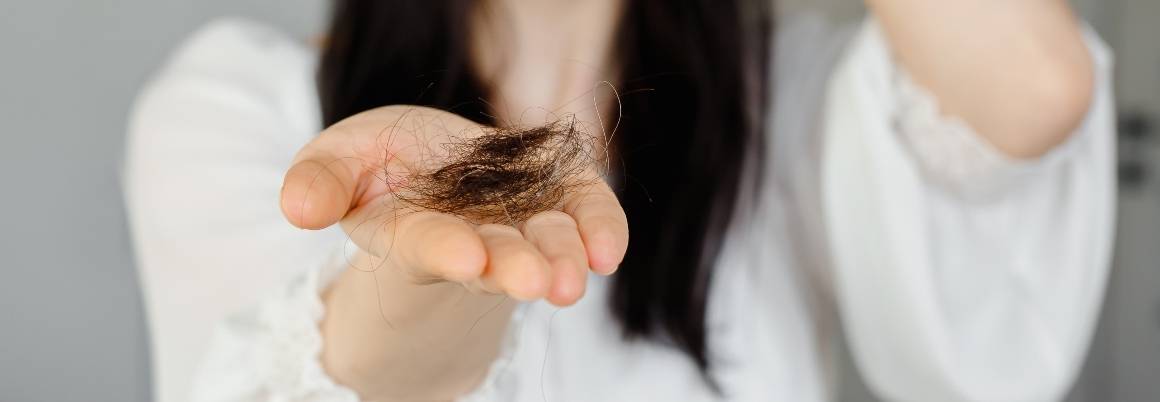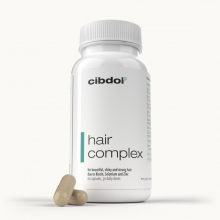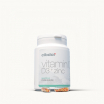Can Zinc Deficiency Cause Hair Loss?
Published:
Hair loss is a common problem that affects both men and women. While genetics play a major role, nutrient deficiencies like zinc can also contribute to hair thinning and shedding.
Contents:
- What Is Zinc and Why Is It Important?
- What Are The Symptoms of Zinc Deficiency?
- How Is Zinc Linked To Hair Loss?
- What Are The Best Food Sources Of Zinc?
- Can Zinc Supplements Help Treat Hair Loss?
- Tips To Prevent Zinc Deficiency Hair Loss
- The Bottom Line
- Frequently Asked Questions on Zinc Deficiency and Hair Loss
Zinc is an essential mineral that is involved in many aspects of cellular metabolism. It plays a key role in hair tissue growth and repair.

In this article, we’ll discuss the link between zinc and hair loss. We’ll also cover zinc deficiency symptoms, food sources of zinc, and whether zinc supplements can help treat hair loss.
What Is Zinc and Why Is It Important?
Zinc is a trace mineral that is naturally present in some foods and available as a dietary supplement. It is also available as a topical treatment.
This mineral is essential for immune function, protein synthesis, DNA and cell reproduction, and tissue growth and repair. Zinc also has antioxidant properties that help protect cells from damage caused by free radicals.
In terms of hair health, zinc plays a vital role in:
- Hair tissue growth and repair
- Production of hair proteins like keratin
- Regulation of hormone levels
- Maintenance of the oil secreting glands in the scalp
What Are The Symptoms of Zinc Deficiency?
Zinc deficiency is quite common, especially in developing countries. It's estimated that up to 2 billion people worldwide have inadequate zinc intake.
Some signs and symptoms of mild to moderate zinc deficiency include:
- Loss of appetite
- Decreased sense of taste and smell
- Frequent colds and infections
- Hair loss
- Skin lesions and dermatitis
- Diarrhea
- Mental lethargy
Severe and prolonged zinc deficiency can also cause stunted growth and endocrine system abnormalities.
As you can see, one of the key symptoms of low zinc levels is excessive hair shedding and thinning. Let's explore the connection further.
How Is Zinc Linked To Hair Loss?
Research shows that zinc is incredibly important for maintaining healthy hair and preventing hair loss. Here are some of the ways zinc influences hair growth:
Zinc regulates hormone levels
Zinc is needed for the production of hormones like testosterone and prolactin. Many hormonal imbalances can trigger telogen effluvium, a form of temporary hair loss.
Zinc maintains hair follicle health
The hair follicle cells have a quick turnover rate and depend on adequate zinc for cell division and metabolism. Zinc deficiency impairs this cycle, weakening the hair follicles.
Zinc enables protein synthesis
Zinc is needed to produce the protein building blocks that make up your hair. A lack of zinc can reduce amino acid uptake and keratin synthesis.
Zinc has antioxidant effects
It helps protect hair cells from free radical damage. This is important because oxidative stress can accelerate hair aging.
Zinc supports immune function and scalp health
It prevents dandruff and scalp inflammation that can negatively impact hair growth.
So in summary, if you don't consume enough zinc for a prolonged period, it can disrupt many biological processes that are critical for healthy, full hair.
What Are The Best Food Sources Of Zinc?
The recommended daily intake is 8-11 mg of zinc for adults. The best dietary sources include:
- Oysters - A 3-ounce serving contains 74 mg zinc, which is over 500% of the RDI.
- Meats like beef, lamb and chicken. A 3-ounce serving of beef chuck roast provides 7 mg zinc.
- Beans like chickpeas, lentils and baked beans. 1 cup of cooked lentils has 3 mg.
- Nuts and seeds like cashews, almonds, pumpkin seeds and hemp seeds. An ounce of dry roasted cashews has 1.6 mg.
- Dairy products like yogurt, cheese and milk. One cup of plain yogurt provides about 1-3 mg.
- Whole grains like wheat germ, oats, brown rice and quinoa.
- Seafood like lobster, crab and salmon.
As you can see, animal foods like meat and seafood contain the highest amount of zinc per serving. So vegetarians may require 1.5 times higher zinc intake.
Can Zinc Supplements Help Treat Hair Loss?
There is some emerging research showing zinc supplementation may help boost hair growth, especially in those with deficiency.
In one study, 66 patients with alopecia took a daily zinc gluconate supplement for 12 weeks. Hair regrowth was observed in alopecia areata, telogen effluvium and androgenic alopecia.
Another trial found that oral zinc therapy was effective at treating zinc deficiency telogen effluvium in premenopausal women. Hair shedding reduced after several months of supplementation.
While the research is limited, zinc supplements do appear helpful for certain types of hair loss. But it’s unclear what dose is ideal or how long treatment should continue.
Speak to your doctor before taking any zinc supplement, especially if it’s in doses over 40 mg per day. Too much zinc can cause toxicity symptoms like nausea, headaches and immune changes.
Instead of supplements, focus first on getting enough zinc from whole food sources like oysters, meats, nuts and legumes. This allows for steady absorption along with other hair healthy nutrients.
7 Tips To Prevent Zinc Deficiency Hair Loss
If you notice sudden increased hair shedding, zinc deficiency could be the culprit. Try these practical tips to improve your zinc status:
1. Eat more zinc-rich foods
Aim for foods like oysters, red meat, poultry, nuts, seeds, legumes, dairy and whole grains daily.
2. Soak and sprout legumes
This reduces phytic acid, which can block zinc absorption from plants.
3. Limit sugar, alcohol and caffeine
These can decrease zinc bioavailability and lead to losses through urine.
4. Manage stress levels
Chronic stress causes excess zinc excretion, depleting body stores.
5. Check for digestive issues
Poor gut health reduces zinc absorption. Get tested for leaky gut, IBS, or SIBO.
6. Boost stomach acid naturally
Low HCl impairs zinc absorption. Try apple cider vinegar with meals.
7. Discuss supplements with your doctor
If diet isn't enough, zinc gluconate is a bioavailable form to try.
The Bottom Line
Zinc is an essential mineral for normal hair growth and preventing excessive shedding. Deficiency affects many metabolic processes involved in hair follicle health.
Symptoms like hair loss, diarrhea, skin problems and poor immunity may indicate you need more zinc. Animal foods contain the highest amount of zinc. Vegans and vegetarians should pay special attention to meeting their daily needs.
Increasing zinc intake through diet should be your first approach. But supplements can also help reverse deficiency, especially if poor absorption is an issue.
Speak to your healthcare provider to determine if zinc deficiency may be causing your hair loss. With the right diagnosis and treatment plan, zinc levels can be restored to promote strong, healthy hair regrowth.
Frequently Asked Questions on Zinc Deficiency and Hair Loss
What is zinc and why is it important for hair health?
Zinc is a trace mineral that is essential for many bodily functions including hair growth. It helps produce keratin, regulates hormone levels, maintains hair follicle health, enables protein synthesis, and protects hair cells from oxidative damage.
What causes zinc deficiency?
The most common causes are inadequate dietary intake, malabsorption issues, chronic diseases, vegetarian/vegan diets, gastrointestinal disorders, medications, and older age.
What are the symptoms of zinc deficiency?
Symptoms include hair loss, diarrhea, loss of appetite and taste changes, skin lesions, frequent infections, mental lethargy, changes in immunity, and problems with wound healing.
How does zinc deficiency lead to hair loss?
Zinc deficiency disrupts hormonal balance, protein synthesis, and follicle health which can trigger telogen effluvium. It also causes oxidative damage to hair cells and scalp inflammation which impairs healthy hair growth.
What types of hair loss are associated with zinc deficiency?
The research shows links between zinc deficiency and alopecia areata, telogen effluvium, female pattern hair loss, and androgenic alopecia.
How much zinc per day is recommended for healthy hair?
The RDI for zinc is 8-11 mg per day for adults. Some studies suggest up to 30 mg per day may be optimal for hair regrowth. But high doses over 40 mg daily can cause toxicity.
What are the best dietary sources of zinc?
Oysters, red meats, poultry, beans, nuts, seeds, whole grains, dairy, and seafood are excellent sources. Soak and sprout legumes to increase zinc bioavailability.
Should I take a zinc supplement for hair loss prevention?
Studies show zinc gluconate supplements may boost hair growth in those with deficiency. But foods should be your first focus. Check with your doctor before supplementing.
How can I prevent zinc deficiency hair loss through diet?
Eat zinc-rich foods daily, limit sugar/caffeine/alcohol, manage stress, treat digestive issues, and use apple cider vinegar to improve zinc absorption from meals.
How long does it take to reverse zinc deficiency hair loss?
Studies show noticeable reductions in hair shedding and re-growth after 3-4 months of zinc supplementation. But consistency is key.
When should I see a doctor about zinc and hair loss?
See a doctor if you have symptoms of zinc deficiency along with unexplained hair shedding. Blood testing can confirm if low zinc is an underlying cause.
Are there any risks or side effects of too much zinc?
Yes, high zinc doses over 40 mg per day long-term can cause nausea, headaches, copper deficiency, impaired immunity and other problems.
Can zinc deficiency contribute to hair loss in women and men?
Yes, research shows zinc deficiency can potentially cause hair loss in both women and men. Groups at risk include vegetarians, older adults, and those with malabsorption issues.
What other nutrients may help prevent hair loss?
Protein, iron, vitamin D, omega-3s, B-complex vitamins, vitamin C, selenium, and silica are important for hair health and preventing excessive shedding.
Should I apply zinc directly to my scalp or hair?
Topical zinc products like shampoos may help reduce dandruff, but more research is needed on their effects for hair growth. Oral zinc is likely more effective.
















